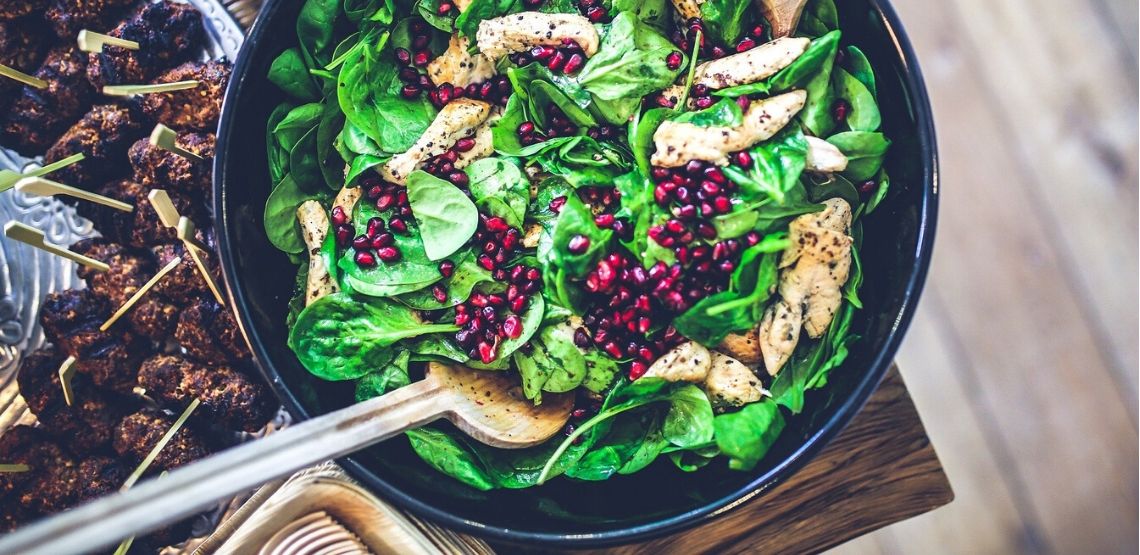Beyond the Plate
Eating a whole food diet is the key to living your best life because the quality of food within it is nourishing to the body. No matter what particular type of diet you choose to adhere to (paleo, vegan, plant based), ensuring it includes whole food sources is the recipe for true longevity.
Moving Away From Diets
Diet is probably the wrong word for what we are trying to convey here. After all, the word diet is associated with a particular way of eating (often including food restrictions) to lose weight.
A whole food diet is the total opposite and it is something that should be used long term for great health, outside of losing weight. Do keep in mind though that when a person is sticking to a whole food eating plan, weight loss is a natural, healthy side effect.
What Does Whole Food Mean?
For a food to be considered a whole food it has to meet the following criteria:
- It is has been grown in the ground.
- It has been hunted, farmed or fished.
- It has been minimally processed.
- No refined sugar, salt, chemicals (including preservatives, additives and colorants) or industrial oils.
Whole foods are proven to be the best foods for us to consume, whereas processed foods are the worst. It is now well known that there is a significant link between consuming processed food regularly, weight gain and the risk of developing certain chronic diseases (such as type 1 diabetes and heart disease).
Examples of Processed Foods
Typically, if a food item you buy has five or more ingredients listed or contains ingredient names you do not understand or cannot pronounce, then it is not a whole food. Common examples of processed foods include frozen and boxed meals.
Why are Whole Foods Important?
Whole foods are fresh, natural foods. Highly processed foods are foods that have had a lot of their nutrients stripped during processing, which means the end result for your body is fewer nutrients from the food.
Also, very often included in processed foods are extra ingredients that are not good for your body, such as:
- Refined sugar (linked to diabetes and obesity)
- Industrial seed oils (linked to dementia)
- Chemicals (many are banned in various countries for their negative effects on health) such as artificial food colors, which can increase symptoms in those with ADHA, and nitrates, which can interfere with the thyroid function and can increase the risk of developing some cancers
Many times, the above extra ingredients are added to ensure the product is fresh when you consume them, and some are to add flavor and taste to get you hooked and keep you coming back for more.This is why processed food can be so dangerous.
What Foods are Considered Whole Foods?
Fresh Fruit
All kinds of fresh and dried fruit, preferably in their whole, natural state, are considered whole foods. These can include apples, bananas, blueberries, raspberries, cranberries, figs and avocados.
Fresh Vegetables
This includes all kinds of fresh and dried vegetables, preferably in their natural state. Whole food vegetables can be things like potatoes, green beans, broccoli, leafy greens, cauliflower, cucumber, radishes and tomatoes.
Dairy and Animal Protein
This includes foods such as freshly cooked organic protein including fish, beef, chicken and pork. When cooking, ensure the protein is not overcooked; This can produce carcinogens.
If you consume dairy, choose those that are as close to natural and freshly milked as possible. Be sure that the source is trusted and is offering safe consumption. When opting for yogurts, ensure they are free from added sugar and other chemicals and additives.
Grains, Beans, Nuts and Seeds
All grains, beans and nuts originally come from seeds, and these groups make up a part of a healthy diet, as they contain complex carbohydrates and healthy fats.
Foods like chickpeas can be turned into hummus, wholewheat grains can be turned into fresh and dried pasta, rice and quinoa can be a side dish when boiled and nuts can make tasty nut butter.
Tips for Including Whole Foods Into Your Diet
Now that you know what whole foods are and what foods are considered whole foods, it is easier to pick and choose which you would like to add to your daily diet. Here are some tips.
Plan Your Grocery List
When going shopping for your weekly meals, the key is to plan before you buy. Plan your budget first, then plan your meals within that budget. Plan some tasty meals, plan some new meals with foods you have never perhaps tried before and within all of this, choose to use as many wholefoods as possible.
Incorporate Whole Foods Gradually
If you are new to using whole foods, it can seem overwhelming at first to completely switch out all the processed foods in your diet for wholefoods. So go easy at first; ensure your weekly meal plan includes some wholefoods and slowly increase the amount as the weeks go by.
Now You Know a Whole Lot About Whole Foods
One thing is for sure, whole foods are are beneficial to health, whereas processed foods come with a whole lot of concerns and risks. So, wherever you are at in your journey with food, treating your body with kindness is key, and there is no better way to be kind and loving to your body than by eating whole foods.
Article Resources
- Harvard Health Publishing (Common food additives and chemicals harmful to children)
- Medical News Today (Dementia risk higher in those who eat more trans fats)
- Medical News Today (More evidence that ultra-processed foods could harm health)
- World Health Organization (Diet, nutrition and the prevention of chronic diseases)
- Harvard T.H Chan School of Public Health (Processed Foods and Health)

